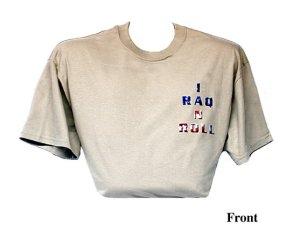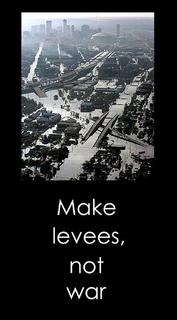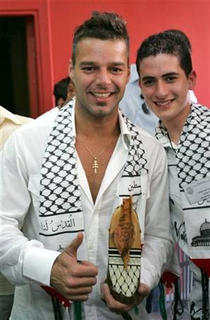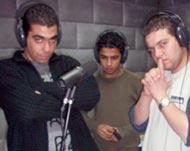

The fourth anniversary of 9/11 is being marked by the first (and perhaps last?) "America Supports You Freedom Walk," sponsored by the Defense Department. Its aim: to honor the victims of 9/11 and US military personnel, and to celebrate freedom. Starting in the Pentagon South parking lot, the two mile walk goes through Arlington National Cemetery and ends at the reflecting pool on the National Mall. As befits such a non-partisan, non-political event, the event concludes with a free concert featuring country music star Clint Black. Clint is the perfect figure for this event, based on his hit single “Iraq & Roll,” released in March 2003. According to
some it served as the unofficial anthem of our invading troops.
I don’t know whether he will play the song or not today, but given the song’s importance in the event and how it is constructed, I thought I’d do my own “reading” of its lyrics.
Iraq & Roll (written by Clint Black & Hayden Nicholas)
You can wave your signs in protest
Against America taking stands
The stands America’s taken
Are the reason that you can
Critics of peace protesters love to say, in fact they love to yell at you: if it wasn’t for the soldiers in Iraq defending you, you wouldn’t be able to stand there and protest. The implication: shut the fuck up, you shouldn’t be protesting against the people who are fighting for you. Of course, the peace protests have never been against “America taking stands,” but against America taking the wrong stand in Iraq.
If everyone would go for peace
There’d be no need for war
But we can’t ignore the devil
He’ll keep coming back for more
The message: protesters, you are naive, pacifism is stupidly idealistic. There are evil and aggressive people in the world. Furthermore, it’s “the devil” (Saddam/Bin Laden/terrorists) we’re dealing with here. This is the only point in the song where Clint invokes a religious figure. The song is for the most part about patriotism.
Some see this in black and white
Other only gray
We’re not begging for a fight
No matter what they say
If you see things in shades of gray, you don’t understand that the enemy is the devil. “We’re not begging for a fight”: No aggression involved here!
We have the resolution
That should put’em all to shame
But it’s a different kind of deadline
When I'm called in the game
Clint is referring to the UN resolutions and deadlines. He implicitly acknowledges that there was no UN mandate for the invasion but that US interests and prerogatives are higher than international legitimacy. The USA has the resolution--as in resoluteness or resolve--that supercedes or trumps (puts to shame) international resolutions. And the rules of the game change, and deadlines work differently, when the US is involved.
(Chorus)
I raq I rack 'em up and I roll
I'm back and I'm a high tech GI Joe
I pray for peace, prepare for war
And I never will forget
There’s no price too high for freedom
So be careful where you tread
The chorus is the most insidiously clever part of this song, and in particular, the first line. Here’s how it sounds: I rock, I rack ‘em up, and I roll. The “Iraq” in the title could refer to either/or both the phrase, “I rock” and/or the phrase, “I rack,” depending on how you pronounce them. It’s a pretty decent “country” pun. The line invokes rock ‘n’ roll and all its mythologies, and it marks how the vernacular meanings of the term have shifted or acquired new connotations. When rock ‘n’ roll music first took hold in US culture, the not-too-hidden implication of “rock ‘n’ roll” was sex, the act of love-making. Eventually--and I’m not sure when--the term took militaristic connotations. (Maybe it was all those phallic guitars?) Hence the phrase, “let’s rock’n’roll” can mean, in certain contexts, let’s go kick some ass, and is frequently invoked by men with weapons who are saddling up for a fight. “I rack ‘em up” probably refers to racking up numbers of “kills.” High tech GI Joe invokes the technologized character of the US military in the Iraq war. “I never will forget”--forget what? 9/11, I guess, drawing the by-now (and even then, in 2003) completely discredited notion of a connection between Saddam and al-Qaida. “Pray for peace”: I wonder when Clint ever did that? “No price too high for freedom”: America’s illegal invasion and occupation a country that posed no military threat to the US and had no WMD’s. Price tag of “freedom” to date: nearly $200 billion. “Be careful where you tread”: a reference to the flag widely flown in the American Revolution, with a rattlesnake and the slogan, “Don’t Tread on Me.” One thing about Clint, he really knows his history.
This terror isn’t man to man
They can be no more than cowards
If they won’t show us their weapons
We might have to show them ours
Yep, those “terrorists” sure are cowards. Only mano a mano combat is real manly combat. “Show us your weapons,” you coward! But are we talking dicks or weapons here? This verse too supports the equation of Saddam with 9/11, the invasion of Iraq with the global war on terror.
It might be a smart bomb
They find stupid people too
And if you stand with the likes of Saddam
One just might find you
“Smart bombs”: more reference to high tech GI Joe weapons. Clever reversal here, Clint: “smart” bombs finding “stupid” people. Who are the stupid people? Those who “stand with the likes of Saddam.” No civilian casualties involved! The description also prefigures what Rumsfeld used to say about Iraqi insurgents in the early days of the occupation: they’re just Ba’athist remnants and dead-enders.
(Chorus II)
I rock, I rack’ em up and I roll
I'm back and I'm a high tech GI Joe
I've got infrared, I've got GPS
And I've got that good old fashioned lead
There’s no price too high for freedom
So be careful where you tread
The second chorus elaborates on and celebrates the military’s high tech capabilities: infrared (night vision), GPS (global positioning systems), and if all else fails, good old lead bullets. (It turned out, of course, that not all the GI Joes were high tech and not everyone had infrared and GPS, especially National Guard units, and that the lead didn’t help much against the IED’s [Improvised Explosive Devices], especially if your Humvee didn’t have good armor or you didn’t have decent body armor.)
(Bridge)
Now you can come along
Or you can stay behind
Or you can get out of the way
But our troops take out the garbage
For the good old USA
Best, of course, if you “come along” on this adventure. But if you don’t,
better get out of the way. “Our troops take out the garbage”: a domestic chore and the killing of the enemy are semantically merged and normalized.
(Final chorus)
I raq, I rack 'em up I roll (In the USA)
I raq, I rack 'em up I roll (talkin’ ‘bout the USA)
I raq, I rack 'em up I roll (In the USA)
I raq, I rack 'em up I roll (talkin’ ‘bout the USA)
I raq, I rack 'em up I roll (In the USA)
And it sounds like, I rock, I rack ‘em up and I roll. But in the final chorus, somehow, it suggests that this is now happening in the USA rather than Iraq? What kind of “kills” are we “rackin’ up” in the USA, Clint? Is it those who are not “getting out of the way”?
P.S. You can buy
Iraq and I Roll t-shirts from the official Clint Black website. Here’s the pitch:
“The Clint Black Foundation has established a fund to benefit the families of soldiers killed in Operation Iraqi Freedom. Clint Black is providing all the necessary administrative costs to make sure 100% of the proceeds will go to the families. One way to contribute to this fund is to purchase this specially designed t-shirt with a design that highlights his available-only-on-the-Internet single, "Iraq & Roll."













